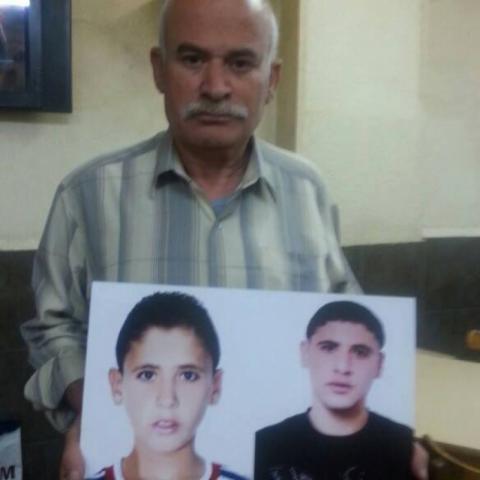
Geneva, 21 June 2016
The United Nations Working Group on Arbitrary Detention (WGAD) has recently published its Opinion on the case of Mohammed Mahdi Saleh Suleiman, a Palestinian teenager who was sentenced to 15 years in prison by a military court for "throwing stone" in the Hares Boys case. In the decision, the UN experts qualified his detention as 'discriminatory' and 'arbitrary' while calling upon Mohammed's immediate release by Israel.
Mohammed was only 16 years old when he was arrested on 15 March 2013 by members of the Israeli Defence Forces' special force – the "Sayeret Matkal" – who broke into his family house. They beat him up with rifle butts and interrogated him about his and his friends' alleged stones throwing at cars driving along Route 5 in Hares, West Bank, which had caused a car accident the previous day. Mohamed was then brought to Al Jalame prison in northern Israel where investigators tortured him. In particular, he was forced to stand naked in painful positions for prolonged periods of time, physically and verbally abused for hours while shackled by hand and feet to a chair and kept in solitary confinement. Investigators forced him to sign a document without letting him read it beforehand and denied him access to his family and lawyer for three weeks. Mohammed was then transferred to Megiddo prison where he is still currently detained.
On 29 April 2013, the Salem Military Court indicted Mohammed and the four other "Hares boys" with more than 20 counts, including "attempted murder by way of throwing stones". For the following two years, more than 20 hearings were held, systematically prolonging Mohammed's detention without any justification. On 26 November 2015, Mohammed was sentenced to 15 years of imprisonment and a heavy fine, on the basis of the document he was forced to sign under torture.
Contacted by Mohammed's parents, Alkarama raised his case with the Working Group on Arbitrary Detention (WGAD) in July and December 2015, calling upon the five UN experts to qualify his detention as arbitrary and request his immediate release. The Opinion on Mohammed's case was adopted on 21 April 2016, during the Group's 75th session, in spite of Israel's refusal to collaborate with the WGAD.
In its decision, the UN qualified Mohammed's detention as "arbitrary" basing its decision on the fact that the teenager was arrested without a warrant, tortured and forced to signed a declaration as well as denied access to his family and lawyer, all being in violation of his fundamental rights and fair trial rights, enshrined in the International Covenant on Civil and Political Rights (ICCPR). The experts added that, being 16 at the time of the arrest, he "had the right to be tried by a juvenile justice system in a speedy manner" and that the fact that he was "brought to trial and sentenced without having sufficient time to prepare his defence or to confer with a lawyer and in a military tribunal that lacks the impartiality and independence required by international law" also constituted a breach of the Convention on the Rights of the Child (UNCRC), ratified by Israel in 1991.
In this regard, the UN Group reminded the Israeli authorities that they were bound by the recommendations of the Committee of the Rights of the Child (CRC), which had urged it to "dismantle the institutionalized system of detention and use of torture and ill-treatment of Palestinian children at all stages of the judicial procedure" as well as to "review and amend all laws that allow the sentencing of Palestinian children to 20 years in prison for having thrown stones, and remove from detention all children that are held there for this reason."
Lastly, the UN experts retained Alkarama's arguments according to which Mohammed was targeted by the Israeli authorities because he is an Arab Palestinian child and that his detention was therefore discriminatory in nature. "Had an Israeli teenager be in Mohammed's situation, he would never have been subjected to this appalling treatment, torture and unfair trial," says Inès Osman, Alkarama's Legal Officer responsible for Palestine. "This case is emblematic of a deeply entrenched discrimination against Palestinians in Israel's practices and policies, in blatant disregard for the principle of equality."
-- ENDS --
For more information or an interview, please contact:
- Alkarama's Media team: media@alkarama.org or +41 22 734 10 08
Alkarama Foundation is a Geneva-based, non-governmental human rights organisation established in 2004 to assist all those in the Arab World subjected to, or at risk of, extra-judicial execution, enforced disappearance, torture and arbitrary detention. Acting as a bridge between individual victims in the Arab World and the United Nations human rights mechanisms, Alkarama works towards an Arab world where all individuals live free, in dignity and protected by the rule of law. In Arabic, Alkarama means 'dignity'.
